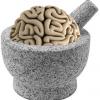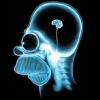I'm not entirely sure if you are asking if any adverse pharmacological interactions exist between the St. John's Wort alkaloids and Phenibut, or if you are asking opinions on the effectiveness of this combination. This happens to be one of my primary specialties and areas of research experience. (Both in clinical study settings, and in biochemical development - by evaluating methodology for synthesizing new derivatives of the hyperforin alkaloids and related alkaloids). In fact, in people with Generalized Anxiety Disorder, Agoraphobia (Social Anxiety Disorder), and depressive conditions that are accompanied by generalized anxiety, the combination of St. John's Wort extract and Phenibut is one of my all-time favorite combinations for the treatment of these disorders (in patients who cannot tolerate the side-effects of many prescription serotonergic antidepressants, do not want to become dependent on a benzodiazepine drugs, or who are simply looking for mild-moderate relief from a natural treatment), since these conditions are caused by two key neurochemical imbalances (GABA and Serotonin). While the Phenibut effectively addresses the GABA-mediated side of these disorders, the hyperforin alkaloids can effectively address the serotonergic side of the disorder - and when used in combination, they can be a much more effective treatment for the above listed conditions than many people realize. In several clinical studies, the St. John's Wort alkaloids have been found to be very comparable in effectiveness to some of the existing synthetic prescription serotonergic antidepressants (including some Tricyclic Antidepressants and some Selective-Serotonin Reuptake Inhibitors), and St. John's Wort extracts are even available by prescription in some countries, such as Germany.
First, to the point of drug interactions. Phenibut's three primary pharmacological mechanisms-of-action include: (1) Action as a selective and competitive metabotropic GABA -B Receptor agonist; (2) As a TAAR1 ("Trace Amine-Associated Receptor 1") antagonist (blocking the binding of endogenous B-phenethylamine (an excitatory intermediate neurotransmitter that can induce anxiety) ), and (3) as an a2o-subunit Voltage-Gated Calcium Channel inhibitor. (Leading to the "calming" of several voltage-dependent Ca+ channel systems in the brain and spinal cord).
The St. John's Wort alkaloids' (hypericin, hyperforin, adhyperforin, amentoflavone, etc) pharmacology is a bit more complex than originally believed, and over the years has been defined as having specific target binding affinities, and actions at, a number of neurotransmitter sites, through a number of distinct mechanisms-of-action. Originally, it was believed that the antidepressant action of St. John's Wort was via action as an Monoamine Oxidase Inhibitor (MAOI), and it was believed that the principal alkaloid for St, John's Wort's effects was Hypericin - which does possess some slight MAOI activity, but possesses greater pharmacological action (and a more medically noteworthy action) on the synaptic reuptake of several of the key monoamine neurotransmitters. More recent studies have also noted the effects of hyperforin and adhyperforin on the synaptic reuptake of several of the key monoamine neurotransmitters, including serotonin, dopamine, norepinephrine, etc. (As well as some effect on the synaptosmal reuptake of GABA and L-glutamate). Some of these flavonol derivative, biflavone, xanthone, and naphthodianthrone alkaloids contained in St. John's Wort also display some weak affinities for GABA -A, GABA -B, and adeosine receptors, as well as down-regulate beta-andrenergic receptors and up-regulate 5-HT1a and 5-HT2a serotonin receptors. (Which may provide additional psychiatric properties, such as anti-anxiety properties, which may contribute to some degree of overall anxiolytic action of St. John's Wort extracts). In summary, this wide array of pharmacological action - primarily on the reuptake of the key monoamine neurotransmitters such as serotonin and dopamine (but also norepinephrine and L-glutamate, etc) - but also with direct and specific binding affinities for some of the serotonin receptor subtypes, as well as adrenergic receptors, makes the overall pharmacological mechanism(s)-of-action of St. John's Wort most similar to some of the more efficient prescription Tricyclic Antidepressants. (Although generally with much fewer interactions, side effects, and better safety and tolerability profile in most patients, compared to most prescription Tricyclics).
So, taking into account the pharmacological mechanism(s)-of-action of both compounds, no, there are no direct adverse interactions or contraindications in taking both of these compounds together, and in my personal experience, the co-administration of these drugs can be very synergistic and highly effective in patients with depression accompanied by generalized anxiety, or for anxiety disorders such as Generalized Anxiety Disorder and Agoraphobia (Social Anxiety Disorder), as well as anxiety conditions that either cause, or coincide with various forms of depression.
As one other poster noted, St. John's Wort extracts do have some pharmacological and metabolic interactions with some drugs and dietary materials (supplements and foods), notably drugs that affect the reuptake (or metabolism) of the monoamine neurotransmitters (in a similar fashion as St. John's Wort) such as Monoamine Oxidase Inhibitor (MAOI) antidepressants, Tricyclic Antidepressants (TCA's), and Selective-Serotonin Reuptake Inhibitor (SSRI) antidepressant drugs - which can lead to very dangerous conditions such as Serotonin Syndrome, as well as drugs and amino acids that are metabolized (or inhibit the release of) cytochrome P450 enzymes (particularly, but not entirely) in the stomach and gastrointestinal tract. - Other drugs that rely heavily on these enzymes for their metabolism may interfere with some St. John's Wort extracts in that their is an insufficient amount of these cytochromes to effectively metabolize both drugs, leading to longer metabolic half-lives for either and/or both drugs, and/or increased blood plasma concentrations of either and/or both drugs that rely on these enzymes for metabolism. Often these reactions are trivial, but in some cases and with some drugs in particular can sometimes cause serious complications.
One of the issues with some St. John's Wort extracts, is the the extraction methods and solvents used still target mostly Hypericin (based on the old research that suggested St. John's Wort antidepressant effect was caused by hypericin's weak MAOI activity), when we now know that other flavonol derivatives, biflavones, xanthones, etc. in St. John's Wort, such as Hyperforin, Adhyperforin, and Amentoflavone contibute to St. John's Wort's antidepressant actions by the mechanisms-of-action listed above. So, it is best to find a full-spectrum extract, and as always with herbal extracts, be sure to find a standardized extract. As far as recommended brands that I have found to be well chemically rounded and consistent, in St. John's Wort supplement brands that we have analyzed include brands such as Spring Valley, Rexall and Sundown, above some of the more commonly available pharmacy brands in the US, like Nature's Way or Solaray.
-John Gona
Oracle Laboratories
NeuroPsych Institute
Edited by Oracle Laboratories, 24 April 2016 - 06:53 PM.


















































